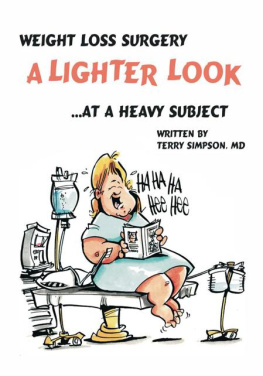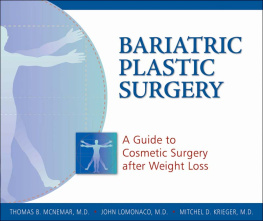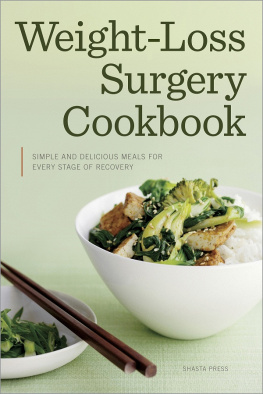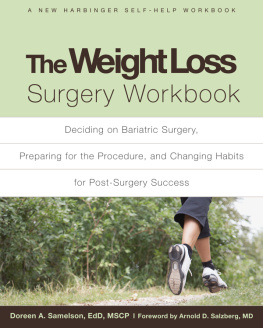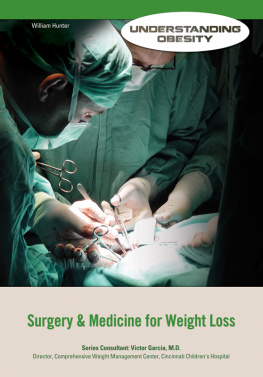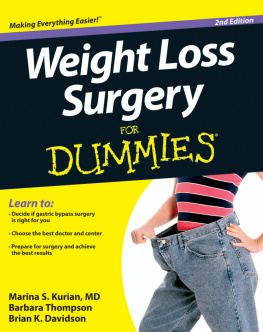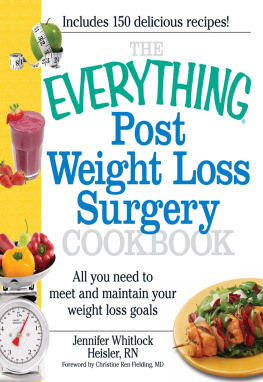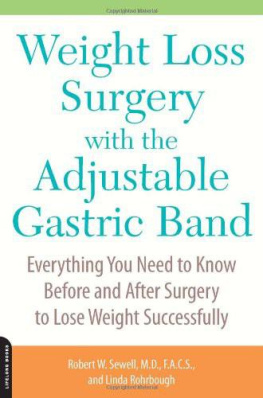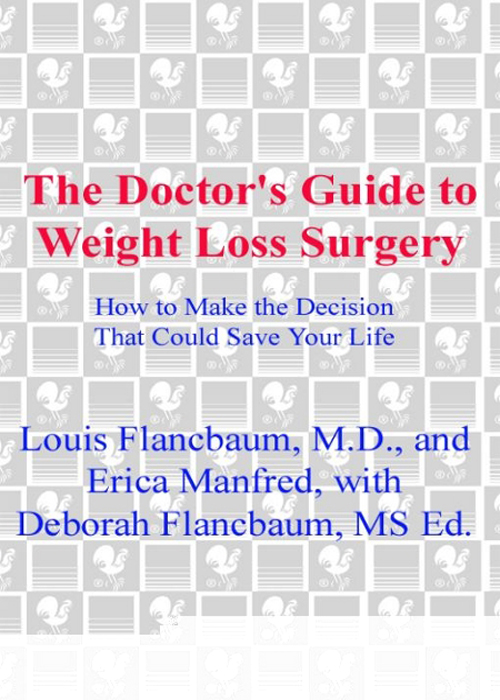
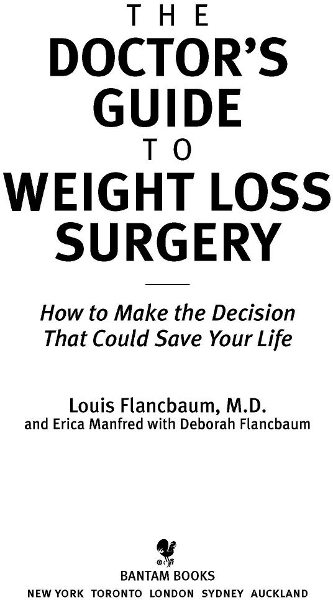
Table of Contents
To all of my patients who have entrusted their lives to me and who, in addition to teaching me much of what I know about bariatric surgery, have taught me a much more important lesson about life. By observing and getting to know them, I have witnessed what it is like to suffer from a chronic illness such as severe obesity and how to be courageous, persevere, and eventually flourish in the face of adversity.
Louis Flancbaum, M.D.
Expert bariatric surgeon Flancbaum has written an excellent and reassuring guide for those considering the surgery. He clearly outlines the surgical options, explaining each type along with its risks and possible complications, as well as expected outcomes. He also explains what to expect before, during, and after surgery, discussing selection of a surgeon, insurance coverage, the surgery itself, pain control, diet, and (rarely) reoperation. Resources and recipes are appended.
Library Journal
This book is a must-read for anyone considering weight loss surgery or just exploring treatment options for morbid obesity. Its well-researched, authoritative and easy-to-read. The authors include one of the top WLS surgeons and a writer who had weight loss surgery, so they know what theyre talking about. Every question a reader might have is anticipated, and ably answered. A great resource!
Belinda Hulin,
features editor, Florida Times-Union
Finally, an authoritative, comprehensive guide from a real expert. The insurance chapter alone is worth the asking price.
Barbara Stras,
Coordinator, Kansas City Weight Loss Surgery Support Group
The information in this book about the risks and rewards of weight loss surgery for the morbidly obese is based on an in-depth review of the current scientific literature, interviews with experts, and the experience of the authors. The authors have written this book because they believe that the more fully informed persons are about weight loss surgery, the better they will be able to make an informed choice.
They have worked to ensure that all information in the book concerning types of procedures, surgical complications, effect on co-morbid conditions, nutritional guidelines, etc., is accurate as of the time of publication.
The book is intended only as a resource guide to help you make informed decisions; it is not meant to replace the advice of a physician. Always seek competent medical help for any health condition or if you have any questions about a specific procedure or health recommendation. Be aware that as medical research and practice advance, therapeutic approaches may change or evolve. This is why a physician is the only reliable source of such advice.
ACKNOWLEDGMENTS
This book owes a lot to the many, many people who pitched in to help get it into print. Most volunteered their time and expertise as a favor, which was amazing, gratifying, and wonderful. We are incredibly grateful to...
Barb Stras, leader of the Kansas City weight loss surgery support group and a marketing expert, who gave unstintingly of her time and great advice. She was always there with encouragement and support when the going got rough.
Virginia Cantarella, one of the best medical illustrators in the business, who contributed the amazing medical illustrations gratis. When we asked how much she would charge, she said, You couldnt afford me, so Ill do them for free. We believe her illustrations are the best ever done of the various weight loss surgeries.
Mitch Sewall, cook extraordinaire, who devoted an enormous amount of time and energy to learning about weight loss surgery in order to come up with recipes that would work for postop patients. We truly appreciate his tasty recipes, which will give people who read the book hope that eating after weight loss surgery doesnt have to be dull but can be a gourmet experience.
Toni Colarusso, nutritionist at St. LukesRoosevelt Hospital, who spent many long hours analyzing the nutritional values of the recipes.
Nicolle Siegel, nutritionist for gastric bypass and duodenal switch patients in Mt. Sinai Hospital, New York, who offered her extensive expertise on post-op nutrition. She gave us advice about such important issues as the post-op diet for duodenal-switch patients, heading off nutritional deficiencies, and how to deal with them if they occur.
Tony C. Merry, a lawyer with Palmer Volkema Thomas in Columbus, Ohio, who was extremely helpful when it came to sorting out the intricacies of the law regarding health-insurance coverage for weight loss surgery.
Finally, Leslie Rutledge and Linda Saxe-Turner, who shared their expertise in dealing with HMOs.
FOREWORD
This is a particularly good time for a book aimed at those who may be considering weight loss surgery. We now understand that obesity is a chronic disease caused by many different factors. Scientists have discovered numerous genes that contribute to weight gain, and, at last count, over 200 genes and gene markers have been identified. There clearly are biochemical differences in the bodies of people with obesity compared to nonobese people.
If an obese person loses weight by standard medical therapy, his or her biochemistry does not return to that of a nonobese person. In fact, biochemical changes occur that tend to favor weight gain and fat gain. Although the genetic contribution to obesity is clearly important, it probably causes only about 40 percent of the obesity in the total population. The other 60 percent may be attributed to environmental causes. The presence of an abundance of inexpensive, good tasting, high calorie, high fat, rapidly available food allows the genetic traits present in most of us to come through as an increase in body weight. More ominous, recent research demonstrates that certain viruses produce obesity in animals and there are links for at least some of these viruses to human obesity.
It is not surprising that the incidence of obesity in the United States and across the world is exploding. In the last twenty years the percentage of adult Americans with medically significant obesity has increased by 75 percent, and more than 55 percent of Americans are overweight. The World Health Organization has declared that there is a global epidemic of obesity. The number of people who meet the criteria for weight loss surgery is now almost 5 percent of the population. Nevertheless, there is still great fear and misunderstanding about weight loss surgery. Many patients in my practice refuse even to discuss the option. Many physicians will not consider sending their patients for this surgery. These attitudes are based on the belief that none of the treatments for obesity is effective and that any treatment for obesity other than diet and exercise may be dangerous.
The reality is that there has been a great deal of research on treatment for obesity, and we now understand that weight loss surgery is the single most effective treatment for individuals who have the severest form of the disease of obesity. Long-term studies on patients who have undergone weight loss surgery show that extensive weight loss may be attained by the majority of patients. Complications of obesity, such as diabetes, high blood pressure, sleep apnea, arthritis, and gastroesophageal reflux disease (heartburn) improve markedly or disappear. One study even shows that weight loss surgery decreases the higher death rate associated with obesity.
The Doctors Guide to Weight Loss Surgery: How to Make the
Next page

